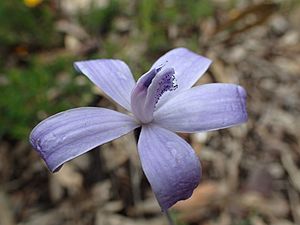Silky blue orchid facts for kids
Quick facts for kids Silky blue orchid |
|
|---|---|
 |
|
| Caladenia sericea growing in a Perth suburb | |
| Scientific classification |
|
| Kingdom: | Plantae |
| Clade: | Tracheophytes |
| Clade: | Angiosperms |
| Clade: | Monocots |
| Order: | Asparagales |
| Family: | Orchidaceae |
| Subfamily: | Orchidoideae |
| Tribe: | Diurideae |
| Genus: | Caladenia |
| Species: |
C. sericea
|
| Binomial name | |
| Caladenia sericea Lindl
|
|
| Script error: The function "autoWithCaption" does not exist. | |
| Synonyms | |
|
|
Script error: No such module "Check for conflicting parameters".
The silky blue orchid (scientific name: Caladenia sericea) is a beautiful plant that belongs to the orchid family. You can find it only in the south-west part of Western Australia. It's quite common in areas that get a lot of rain. This orchid has a single, soft, silky leaf and grows lovely blue-mauve flowers.
Contents
What the Silky Blue Orchid Looks Like
The silky blue orchid is a plant that grows from the ground. It is a perennial plant, which means it lives for more than two years. It's also deciduous, so its leaves fall off at certain times. This plant is a herb and has an underground tuber (like a small potato) that stores food.
It has one soft leaf that feels very silky. This leaf is about 50–120 mm (2–5 in) long and 20 mm (0.8 in) wide.
Its Flowers
The orchid can have up to four pale blue or mauve flowers. Each flower is about 30–50 mm (1–2 in) long and 30–40 mm (1–2 in) wide. These flowers grow on a stalk that can be 150–400 mm (6–20 in) tall.
- The top petal, called the dorsal sepal, stands straight up. It is about 20–30 mm (0.8–1 in) long.
- The side petals and sepals are about the same size as the top one.
- The special lower petal, called the labellum, is 10–15 mm (0.4–0.6 in) long. It has purple spots.
- The sides of the labellum curve upwards, wrapping around the central part of the flower called the column.
- The tip of the labellum curls downwards and has small teeth on its sides.
- There are four to six rows of purple bumps, called calli, along the middle of the labellum.
The silky blue orchid usually blooms from August to early October. It grows many more flowers after summer fires.
How the Silky Blue Orchid Got Its Name
The silky blue orchid was first officially described in 1840 by a person named John Lindley. He wrote about it in a book called A Sketch of the Vegetation of the Swan River Colony.
Later, in 2000, two scientists, Stephen Hopper and Andrew Brown, changed its name to Cyanicula sericea. But then, in 2015, after studying the plant's molecular phylogenetics (which is like looking at its DNA to see how it's related to other plants), Mark Clements changed the name back to Caladenia sericea.
The second part of its scientific name, sericea, is a Latin word. It means "silken" or "silky," which perfectly describes its soft, silky leaf.
Where the Silky Blue Orchid Lives
The silky blue orchid grows in the parts of Western Australia that get more rain. You can find it from Jurien Bay in the north all the way to Esperance in the east.
It lives in different natural areas, including the Avon Wheatbelt, Esperance Plains, Jarrah Forest, Swan Coastal Plain, and Warren biogeographic regions. You can often spot it growing in forests, woodlands, and on granite rocks.
Is the Silky Blue Orchid Safe?
The Western Australian Government's Department of Parks and Wildlife says that Caladenia sericea is "not threatened." This means it is not currently in danger of disappearing.

